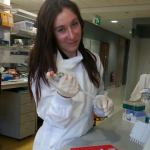
Emma Cazaly
Geneticist
I have always been curious about how things work and why the world is the way it is. While humanities and languages were my favourite subjects at school I became increasingly interested in science in Year 10 and when thinking about possible careers in college, research into the cause and treatment of diseases, particularly cancer really intrigued me. At that time there was no specific university course that drew me in as I was after something between a science degree and medicine. So I started an arts degree, falling back on subjects I loved. After a year I wasn’t sure what career this would lead to and when I received an offer for a new course starting the following year, a Bachelor of Medical Research, it sounded like exactly what I had been looking for.
I found the three year course fascinating and loved the opportunity to study subjects like histology, previously only offered to medical students. The following year of honours research was challenging but very rewarding, but after five years of university I wanted a break from study. I decided to take some time off to travel and also to work in the travel industry. Four years later, I was missing being on the edge of new discoveries and the constant mental stimulation that science brings, so I finally made my way back to research. Although I had planned to do my PhD in Sydney, the time I spent overseas made me appreciate what a great city Hobart is to live and work in, and with a local world class research institute like Menzies offering a wide range of PhD projects the choice was easy.
My PhD project looks at epigenetic and genetic aspects of familial cancer. Epigenetics is a relatively new field of science, focusing on the environment surrounding the DNA and how genes are switched on and off, rather than the genetic code itself. I find it fascinating that practically every cell in our body has the exact same DNA sequence, yet cells from muscle to skin to neurons all look and function in vastly different ways. This is due to epigenetic regulation, a factor also important in understanding, diagnosing and treating many diseases. My research examines the interaction between mutations in the genetic code and the epigenetic environment in relation to the development and progression of prostate cancer.
The roundabout journey I’ve taken to become a scientist illustrates that there is not simply one path to a career in science, you just need a passion to constantly learn, explore and discover.
For further information: www.menzies.utas.edu.au